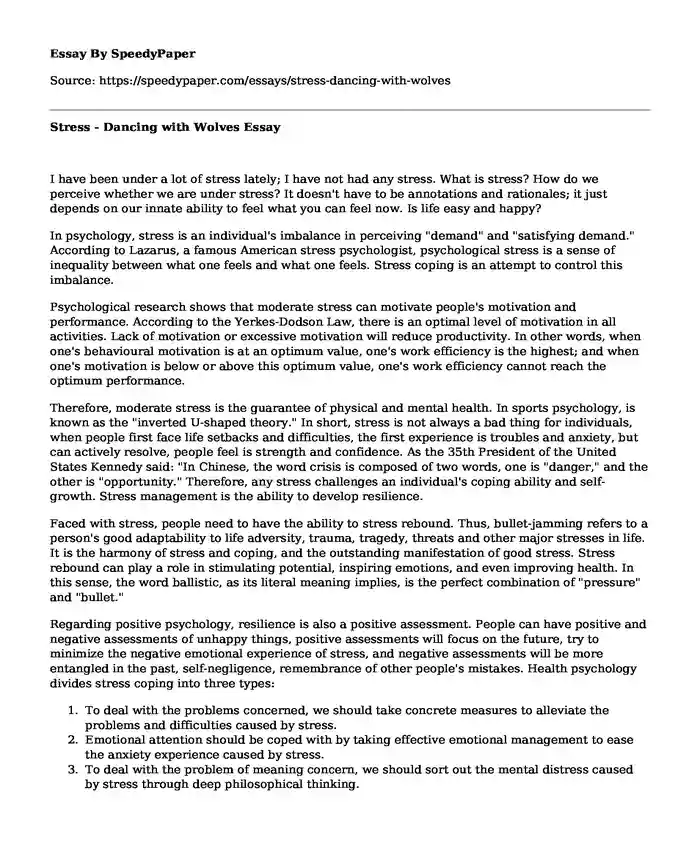I have been under a lot of stress lately; I have not had any stress. What is stress? How do we perceive whether we are under stress? It doesn't have to be annotations and rationales; it just depends on our innate ability to feel what you can feel now. Is life easy and happy?
In psychology, stress is an individual's imbalance in perceiving "demand" and "satisfying demand." According to Lazarus, a famous American stress psychologist, psychological stress is a sense of inequality between what one feels and what one feels. Stress coping is an attempt to control this imbalance.
Psychological research shows that moderate stress can motivate people's motivation and performance. According to the Yerkes-Dodson Law, there is an optimal level of motivation in all activities. Lack of motivation or excessive motivation will reduce productivity. In other words, when one's behavioural motivation is at an optimum value, one's work efficiency is the highest; and when one's motivation is below or above this optimum value, one's work efficiency cannot reach the optimum performance.
Therefore, moderate stress is the guarantee of physical and mental health. In sports psychology, is known as the "inverted U-shaped theory." In short, stress is not always a bad thing for individuals, when people first face life setbacks and difficulties, the first experience is troubles and anxiety, but can actively resolve, people feel is strength and confidence. As the 35th President of the United States Kennedy said: "In Chinese, the word crisis is composed of two words, one is "danger," and the other is "opportunity." Therefore, any stress challenges an individual's coping ability and self-growth. Stress management is the ability to develop resilience.
Faced with stress, people need to have the ability to stress rebound. Thus, bullet-jamming refers to a person's good adaptability to life adversity, trauma, tragedy, threats and other major stresses in life. It is the harmony of stress and coping, and the outstanding manifestation of good stress. Stress rebound can play a role in stimulating potential, inspiring emotions, and even improving health. In this sense, the word ballistic, as its literal meaning implies, is the perfect combination of "pressure" and "bullet."
Regarding positive psychology, resilience is also a positive assessment. People can have positive and negative assessments of unhappy things, positive assessments will focus on the future, try to minimize the negative emotional experience of stress, and negative assessments will be more entangled in the past, self-negligence, remembrance of other people's mistakes. Health psychology divides stress coping into three types:
- To deal with the problems concerned, we should take concrete measures to alleviate the problems and difficulties caused by stress.
- Emotional attention should be coped with by taking effective emotional management to ease the anxiety experience caused by stress.
- To deal with the problem of meaning concern, we should sort out the mental distress caused by stress through deep philosophical thinking.
Effective stress management needs to work hard in three aspects, gradually forming a suitable stress management model for their own. Among them, stress management is like a buffet, what needs to be done, there is no absolute uniform model. For example, James Pennebaker, an American psychologist, did an interesting experiment in which subjects spent 15 to 20 minutes on five consecutive days writing "the most painful experience of their life," or the most disturbing thing at the time.
When the subjects write something, if they want to keep it, they will follow suit. The effect of this self-expression is striking because over time, the immunity of the subject's increases, the number of visits to the doctor decreases dramatically, and the number of absentee days decreases. In short, stress is a "wolf." People should practice "Dancing with Wolves." The phrase was used in the traditional setup to help the cavemen to adapt to the impending danger that was usually caused by the pack of wolves in the jungle; it also brought in the theory of fight or flight response. Stress is the enemy in the current setup, and it is upon an individual to choose the appropriate response be it fighting or fleeing the situation. Fighting entails various stages of stress handling, which involves accepting the situation, evaluating available options and choosing the best option that will help in solving the problem.
Stress leads to a variety of chronic diseases which if not handled earlier leads to dangerous conditions. The diseases include depression, sleep disorder, heart attack, diabetes and weight gain. Stress leads to a vicious circle because different individuals deal with stress differently. Some people may opt to drink alcohol, watch television a lot, binge eating and unhealthy sexual activities. When stressed the body responds by producing adrenaline, which leads to confusion in the immune system. Due to the unusual adrenaline production, the immune system becomes corrupted and may fail to respond as required. The digestive system, for example, is suppressed and the boost for adrenaline leads to an individual feeling tired, and the body becomes confused on when to turn stress response up or down.
Work Cited
Fuller, Matthew D., et al. "Molecular mechanism of calcium channel regulation in the fight-or-flight response." Sci. Signal.3.141 (2010): ra70-ra70.
Cite this page
Stress - Dancing with Wolves. (2022, Aug 19). Retrieved from https://speedypaper.net/essays/stress-dancing-with-wolves
Request Removal
If you are the original author of this essay and no longer wish to have it published on the SpeedyPaper website, please click below to request its removal:
- Practicum Essay Sample
- Banning Bottled Water in Canada - Free Essay on Environmental Problems
- Free Essay on the Paul Revere's House and Its Artifacts
- Feminist Philosophy and Ethics of Care, Free Essay Example
- Free Paper with Some Questions on Healthcare Marketing
- Free Essay on STI Prevention Amongst Teenagers in Hawaii State
- The New Deal for the United States
Popular categories





